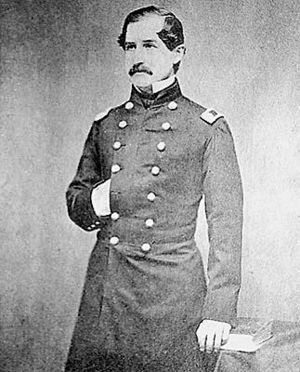Abraham Myers facts for kids
Abraham Myers (also Abram Myers; May 14, 1811 – June 20, 1889) was a military officer. He served in both the United States Army and the Confederate States Army.
Quick facts for kids
Abraham Myers
|
|
|---|---|

Undated photo of Myers in uniform
|
|
| Born |
Abraham Charles Myers
14 May 1811 |
| Died | 20 June 1889 (aged 78) Washington, D.C., US
|
| Resting place | St. Paul's Cemetery Alexandria, Virginia, US |
| Other names | Abram |
| Alma mater | US Military Academy (1833) |
| Occupation | Soldier |
| Spouse(s) | Marion Twiggs |
| Confederate military career | |
| Allegiance | Confederate States |
| Branch | Confederate States Army |
| Years | 1861–1863 / 1864 |
| Rank | Colonel |
| Unit | Quartermaster-General |
| Conflicts | American Civil War |
| US military career | |
| Allegiance | United States |
| Branch | United States Army |
| Years | 1833–1861 |
| Rank | Lieutenant colonel / Colonel |
| Unit |
|
| Conflicts | |
Contents
Early Life and Education
Abraham Charles Myers was born in Georgetown, South Carolina, on May 14, 1811. He was also known as Abram. He joined the United States Military Academy on July 1, 1828. He graduated from West Point on July 1, 1833.
In February 1850, Major General David E. Twiggs named Fort Myers after Abraham Myers. This was because Myers was going to marry Twiggs' daughter. Myers married Marion Twiggs before 1861. He passed away in Washington, D.C., on June 20, 1889. He was buried in St. Paul's Cemetery in Alexandria, Virginia.
US Army Career
After graduating, Myers became a second lieutenant in the United States Army. He was first stationed in Baton Rouge, Louisiana, with the 4th Infantry Regiment. He was promoted to full second lieutenant on December 31, 1835.
Seminole Wars
Myers fought in the Second Seminole War in Florida from 1836 to 1838. He fought in battles at Camp Izard and Oloklikaha. He was promoted to first lieutenant on September 6, 1837. He returned to fight in the Second Seminole War again from 1841 to 1842.
Quartermaster Department
From 1838 to 1840, Myers worked in the Army's recruiting service. He was promoted to staff captain on November 21, 1839. He then moved to the Quartermaster Department in St. Augustine, Florida. The Quartermaster Department was in charge of supplying the army with food, clothing, and equipment.
Mexican-American War
During the Mexican–American War, Captain Myers served under General Zachary Taylor. He fought in the Battle of Palo Alto and the Battle of Resaca de la Palma. His brave actions earned him a promotion to major.
Later, he joined General Winfield Scott's command. He fought in the Battle of Churubusco. For his brave actions there, he was promoted to colonel or lieutenant colonel. From April to June 1848, he was the chief quartermaster for the Army of Mexico.
| Assignments | Dates |
|---|---|
| Charleston, South Carolina Savannah, Georgia |
1848–1849 |
| Department of Florida | 1849–1851 |
| New Orleans, Louisiana | 1851–1854 |
| Department of Texas | 1854–1857 |
| New York City | 1857–1858 |
| New Orleans, Louisiana | 1858–1861 |
From 1848 to 1861, Myers continued to work for the Quartermaster Department. He was stationed in various places, mostly in the southern United States. While in New Orleans on January 28, 1861, he gave up the army's supplies to Louisiana officials. He then resigned from the US Army. He felt his loyalty was to his home state of South Carolina and his adopted state of Louisiana, which had decided to leave the United States.
Confederate Army Career
On March 16, 1861, Myers joined the Confederate Quartermaster-General's Department. He was appointed as a lieutenant-colonel. He became the Confederacy's first acting quartermaster-general on March 25, 1861. This role became official in December, and he was promoted to colonel on February 15, 1862.
Role as Quartermaster-General
When the Confederate capital moved to Richmond, Virginia, Myers' offices were set up there. His staff grew to 88 clerks. This was the largest office in the Confederacy's supply system. As president of the military board, Myers helped design the first Confederate Army uniform. It included a blue flannel shirt, gray flannel pants, and boots.
As quartermaster-general, Myers faced many challenges. He had limited money and the Confederate currency was losing value. The railroads in the South were also in poor condition. Because of these problems, the Confederate States Army often did not have enough supplies. Soldiers lacked clothing and shoes.
End of Service
Myers was removed from his position as quartermaster-general around early 1864. Confederate President Jefferson Davis appointed Brigadier General Alexander Lawton to replace him. The Confederate States Senate first rejected Lawton's appointment. However, Davis resubmitted Lawton's name, and he was confirmed on February 17, 1864.
Myers refused to serve under Lawton. Because of this, he was no longer part of the army. Some historians say Myers resigned on August 10, 1863.
Images for kids
See Also
 | Jessica Watkins |
 | Robert Henry Lawrence Jr. |
 | Mae Jemison |
 | Sian Proctor |
 | Guion Bluford |


